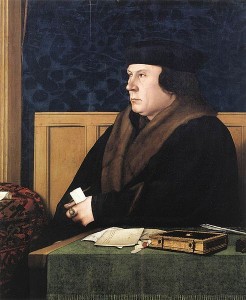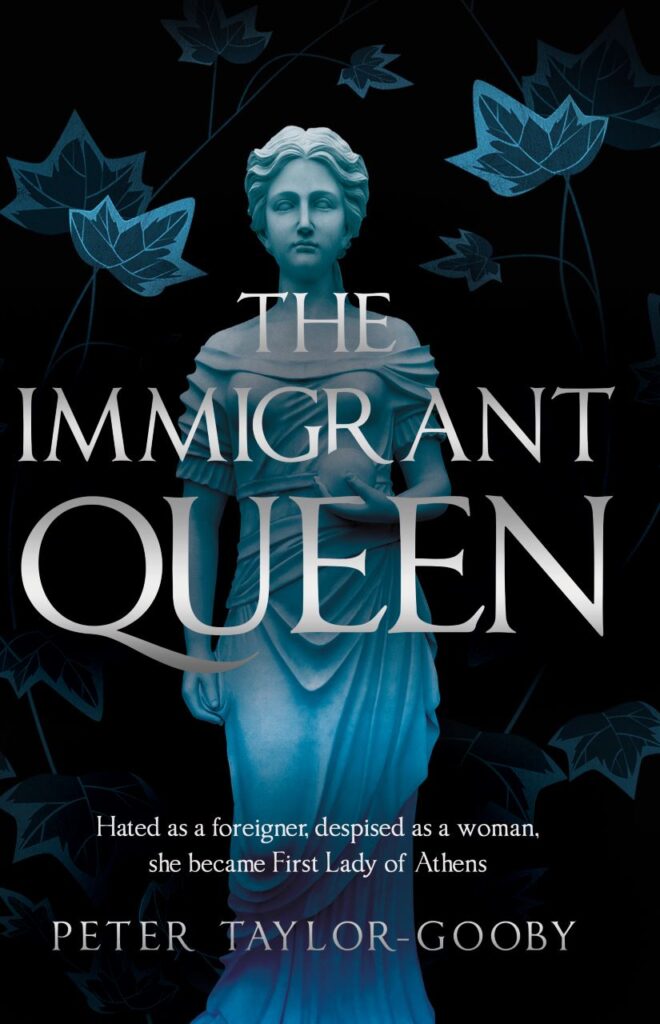Hilary Mantel’s compromise between Then and Now
Kate Braithwaite
In the fourth in our series of features on the novels shortlisted for the Walter Scott Prize, we examine how Hilary Mantel remains true to the language of the past while engaging the modern reader.
 “My boy Thomas, give him a dirty look and he’ll gouge your eye out. Trip him, and he’ll cut off your leg. But if you don’t cut across him, he’s a very gentleman. And he’ll stand anybody a drink.”
“My boy Thomas, give him a dirty look and he’ll gouge your eye out. Trip him, and he’ll cut off your leg. But if you don’t cut across him, he’s a very gentleman. And he’ll stand anybody a drink.”
This is Thomas Cromwell’s father, summing up the principal character of Hilary Mantel’s Bring Up the Bodies. His language is plain and accessible to modern readers, but at the same time, not so modern as to be unbelievable. Cromwell is “a very gentleman” who should not be “cut across”: two of many examples where Mantel’s language hints at another time and place.
Mantel has written about the challenge of language choices for the historical novelist. In an article in the Wall Street Journal in April 2012, she said:
“I use modern English but shift it sideways a little, so that there are some unusual words, some Tudor rhythms, a suggestion of otherness.”
It certainly seems a little ‘other’ to suggest cutting off someone else’s leg.
But perhaps the single choice that impacts most directly on Mantel’s success with language, is her decision to tell the story through the eyes of Henry VIII’s Secretary, Thomas Cromwell. Cromwell is a commoner: not a nobleman, a king or a priest. Of Katherine of Aragon he notes:
“When she was sitting on a silk cushion at the Alhambra, a seven-year-old working her first embroidery, he was scrubbing roots in the kitchen at Lambeth Palace, under the eye of his uncle John, the cook.”
Because Thomas is low-born, he can speak to us in a much more direct, plain fashion than many other characters. Consider the following exchange between Cromwell and one of his enemies, Stephen Gardiner, Bishop of Winchester:
“Henry is not a tyrant,” Gardiner says stiffly. “I rebut any notion that his regime is not lawfully grounded. If I were king, I would wish my authority to be legitimate wholly, to be respected universally and, if questioned, stoutly defended. Would not you?”
“If I were king…”
He was going to say, if I were king I’d defenestrate you. Gardiner says, “Why are you looking out of the window?”
He smiles absently. “I wonder what Thomas More would say to your book?”
“Oh, he would much mislike it, but for his opinion I do not give a fig,” the bishop says heartily, “since his brain was eaten out by his kites, and his skull made a relic his daughter worships on her knees. Why did you let her take the head off London Bridge?”
“You know me, Stephen. The fluid of benevolence flows through my veins and sometimes overspills.”
Gardiner’s language is highly formal and influenced by Latin, just as we know it would have been. Cromwell, on the other hand, does not “rebut” or “mislike”, although he will “defenestrate”, showing that he is no fool, this blacksmith’s son. There is even an entertaining nod here, to the expression “the milk of human kindness”, although of course Cromwell cannot use it: Shakespeare did not write Macbeth until 1605.
What he can do, though, is show us the violence of the times. Reflecting on events in Ireland, he notes that it:
“is quiet this Christmas, in greater peace than she has seen for forty years. Mainly he has brought this about by hanging people. Not many: just the right ones.”
And discussing torture he explains:
“It is better not to specify the nature of the pain. As Juvenal says, the mind is its own best torturer. Besides you should not make empty threats.”
His language seems modern. “Empty threats” and “just the right ones” are familiar phrases served up with Cromwell’s characteristic irony, but the language is balanced always by his context, in these two cases, references to hangings and Juvenal. Cromwell is a man from another age, but he can be understood.
 While he does not personally commit violence, violence is very much part of Cromwell’s life. Arguably it is when he is at his most dangerous that his language is most modern and familiar. His interrogation of Mark Smeaton simmers with brutality:
While he does not personally commit violence, violence is very much part of Cromwell’s life. Arguably it is when he is at his most dangerous that his language is most modern and familiar. His interrogation of Mark Smeaton simmers with brutality:
“No,” The poor boy [Smeaton] shakes his head. “I think she is chaste. I do not know how I came to say what I said.”
“Nor do I. No one had hurt you, had they? Or coerced you, or tricked you? You spoke freely. Master Richard is my witness.”
“I take it back.”
“I don’t think so.”
There is a pause, while the room repositions itself, figures dispose themselves in the landscape of the evening.”
The dialogue is sharp, the menace unmistakable. But in the next line, we, along with the figures in the room, are firmly orientated in Tudor London. Mantel has written that “a writer must broker a compromise between then and now.” The evidence shows that she has succeeded.







